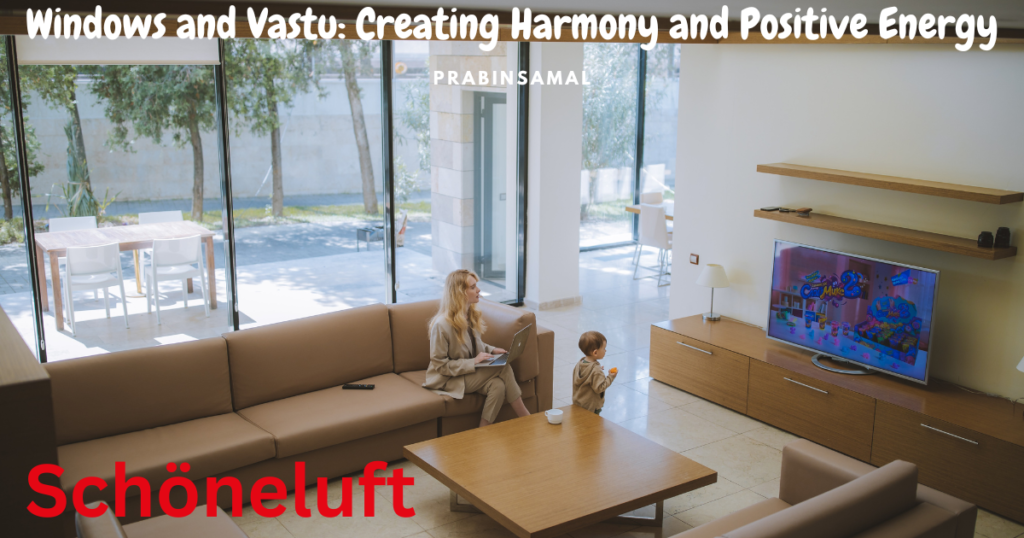Windows and Vastu: Creating Harmony and Positive Energy in Your Home
Windows hold significant importance in Vastu Shastra, the ancient Indian architectural system that emphasizes the harmonious arrangement of elements in a space to promote well-being and positive energy flow. In Vastu, windows are considered integral components of a building’s design and are believed to have multiple significances related to natural light, ventilation, energy flow, and psychological well-being.

1.Natural Light and Illumination:
Windows serve as channels for natural light to enter a space, which is highly valued in Vastu. Sunlight is associated with positive energy, vitality, and overall well-being. Adequate natural light through windows creates a vibrant and uplifting atmosphere within the house. It enhances the aesthetics of the space and promotes a sense of positivity and clarity.
According to Vastu, the eastern direction is particularly significant for windows. East-facing windows allow the morning sunlight to enter the house, symbolizing the arrival of new beginnings and positive energy. They are commonly recommended for rooms such as the living room, dining area, or prayer room, where the energizing effects of the morning sun can be harnessed.
2.Ventilation and Airflow:
Proper ventilation is essential for maintaining a healthy and harmonious living environment. Windows play a vital role in facilitating the flow of fresh air into the house, ensuring proper ventilation and circulation of prana or life force energy. Well-ventilated spaces are believed to promote good health, improve air quality, and create a sense of freshness.
In Vastu, different directions have specific implications for ventilation. North-facing windows are considered ideal for allowing a balanced amount of sunlight and indirect light throughout the day, promoting a comfortable and well-ventilated environment. Bedrooms and study areas are often suggested to have north-facing windows to encourage a calm and peaceful atmosphere.
3.Balancing Energies:
Vastu emphasizes the balance of energies within a space. Each direction is associated with specific elemental energies, and windows contribute to balancing these elements. The strategic placement of windows in different directions helps maintain the equilibrium of elemental energies, creating a harmonious environment.
For example, east-facing windows align with the element of fire and the deity Surya (the sun god) in Vastu. They symbolize the energy of the rising sun and are believed to bring positive vibrations and vitality into the house. West-facing windows, associated with the setting sun and the element of water, are recommended to be smaller or have suitable shading to manage excessive heat and maintain a comfortable environment.
4.Connection with Nature:
Vastu emphasizes the importance of establishing a harmonious connection with nature. Windows serve as conduits for bringing the outside world into the living space, allowing occupants to experience the beauty of the natural environment. The presence of windows that offer pleasant views of gardens, landscapes, or natural elements can create a sense of peace, tranquility, and oneness with nature.
Strategically placed windows that provide views of greenery or natural surroundings are believed to enhance the positive energy within the house. They promote a sense of calmness, reduce stress, and create a soothing ambiance that contributes to the overall well-being of the occupants.
5.Psychological Well-being:
Well-designed and properly sized windows can have a significant impact on the psychological well-being of individuals. Natural light, views of the outside world, and a connection with nature through windows can positively influence mood, productivity, and overall happiness.
Ample natural light entering through windows has been linked to improved mood and increased productivity. It helps regulate the body’s natural rhythms, promotes vitamin D synthesis, and creates a cheerful and invigorating atmosphere. Views of nature, such as trees, flowers, or open spaces, have been found to reduce stress, improve focus, and enhance cognitive function.
In Vastu, it is recommended to have windows of suitable size and placement to optimize the psychological well-being of occupants. Large windows that offer expansive views are preferred, as they create a sense of openness and spaciousness within the house. They allow ample natural light to enter, promoting a positive and uplifting ambiance.
Furthermore, the placement of windows in specific areas of the house is also considered significant in Vastu. For example, windows in the living room are encouraged to be placed on the eastern or northern walls to maximize natural light and positive energy. Similarly, windows in bedrooms are often positioned on the eastern or southern walls to create a serene and restful atmosphere.
It’s important to note that while Vastu principles offer guidelines for window placement and design, personal preferences, architectural considerations, and practicality should also be taken into account. Balancing Vastu recommendations with individual needs and modern lifestyle requirements is essential to create a harmonious and functional living space.
It’s worth mentioning that Vastu practices and beliefs may vary among different regions and individuals. The significance of windows in Vastu is deeply rooted in cultural and traditional beliefs, aiming to create a harmonious and positive living environment.
CONCLUSION
Windows hold great significance in Vastu Shastra. They play a vital role in allowing natural light, promoting ventilation, balancing energies, fostering a connection with nature, and enhancing psychological well-being. By incorporating Vastu principles into window placement and design, individuals can create a harmonious and energizing living space that supports their overall health and happiness.
Note: The information provided above is based on general understanding and beliefs associated with Vastu Shastra. It’s always advisable to consult a Vastu expert or professional for specific guidance tailored to your unique circumstances and requirements.
FAQS
How important are windows in Vastu Shastra?
Windows are considered significant in Vastu Shastra as they play a crucial role in allowing natural light, ventilation, and maintaining a harmonious energy flow in a space.
Which direction is best for windows as per Vastu?
As per Vastu, east-facing windows are considered auspicious for allowing the morning sunlight and positive energy. North-facing windows are also favorable for balanced light and ventilation.
Can I have south-facing windows as per Vastu?
South-facing windows are generally not recommended in Vastu Shastra due to the belief that they may bring in excessive heat and negative energy. However, small windows or suitable shading may be acceptable.
Are there specific guidelines for window sizes in Vastu?
Vastu suggests having adequately sized windows that allow ample natural light and ventilation. Large windows that offer expansive views are favored, creating a sense of openness and positivity.
Can I have windows on the west side of my house?
West-facing windows are acceptable in Vastu, but precautions should be taken to manage excessive heat. Suitable shading, such as blinds or curtains, can help control the heat and maintain a comfortable environment.
How do windows contribute to the flow of energy in Vastu?
Windows act as channels for the flow of fresh air and natural light, facilitating the circulation of positive energy (prana) in a space. They help maintain a harmonious energy balance in alignment with Vastu principles.
Are there specific recommendations for window placement in different rooms?
Yes, Vastu suggests specific window placements for different rooms. For example, east or north-facing windows are recommended for the living room, while east or south-facing windows are suitable for bedrooms.
Can windows impact my psychological well-being as per Vastu?
Yes, windows can have a significant impact on psychological well-being. Ample natural light, views of nature, and a connection with the outside world through windows can positively influence mood, productivity, and overall happiness.
How can I balance Vastu principles with modern architectural designs for windows?
Balancing Vastu principles with modern designs requires considering both Vastu guidelines and practical considerations. It’s important to find a middle ground that suits individual needs, architectural requirements, and personal preferences.
Should I consult a Vastu expert for window placement and design?
If you have specific concerns or require detailed guidance, consulting a Vastu expert or professional can be helpful. They can provide personalized recommendations based on your unique circumstances and requirements.
Please note that the responses provided here are based on general understanding and beliefs associated with Vastu Shastra. For accurate and detailed advice, it is recommended to consult a Vastu expert or professional.
